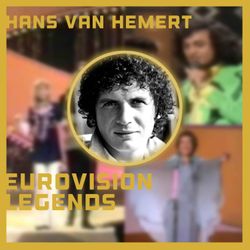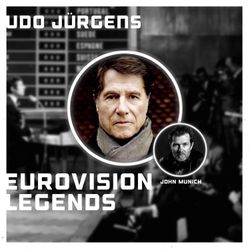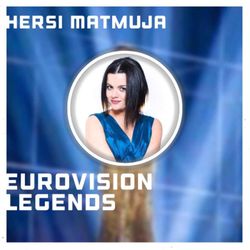Share

Eurovision Legends
Dora
•
Young and totally unknown, Dora took part in the Portuguese pre-selection in 1986, won, and traveled to Bergen where she represented her country in her own unique style with a huge green skirt and thick boots.
Two years later she was an established artist and won again, but didn't have the same control over her participation in Dublin.
First her song was replaced with another one, then the new song was rearranged in a way she didn't like and lastly she was styled totally different than she would have preferred.
Since then she has done a lot, we talk about Brazil, Playboy magazine and McDonalds, among other things
Legend: Dora
Songs: Não Sejas Mau Para Mim & Voltarei (Portugal 1986 &1988)
Host: Emil Löfström
Contact: emil@schlagervannerna.se
More episodes
View all episodes

Loreen
44:15|Having started her career in the Swedish version of pop idol 2004, it took Loreen 7 years before the big breakthrough came. What happened in between and what does she have in common with Leila K. What was her relation to Melodifestivalen before 2011 and what has this competition meant for her career? Hear Loreen tell the story of her trip to Baku, memories from Melodifestivalen, art installations on stage, why Danny said no to ‘’Euphoria’’ and why she is back to the contest after already winning it and failing to qualify to the final. Legend: LoreenSong: Euphoria (Sweden 2012)Host: Emil LöfströmContact: emil@schlagervannerna.seInstagram Facebookhttp//www.eurovisionlegends.se
Jamala
29:42|In 2016, a Ukrainian trained opera singer sang a song about the deportation of Crimeans in 1944, which could easily also be interpreted as a thinly veiled comment on the recent Russian annexation of Crimea.It is sometimes hard to remember that the Russian-Ukrainian conflict has been going on for almost a decade now, but Jamala did try to warn us already back then and sadly she was proven all too correct when Russia invaded the entire Ukraine in February of 2022.She has currently fled the country, but before the contest in Turin Emil managed to get a rare interview with the Ukrainian hero, hiding in an undisclosed location.She tells us about her victory in Stockholm, her jobs as a juror on various - often controversial - Ukrainian national finals and of course about the ongoing war. Emil and Marcus also add their own comments on the situation.Legend: JamalaSong: 1944 (Ukraine 2016)Host: Emil LöfströmSidekick: Marcus BjörkanderContact: emil@schlagervannerna.seInstagram Facebook
Hans Van Hemert
01:03:59|Many countries in Eurovision seem to have their own "super-composer", and in the case of the Netherlands this person is Hans van Hemert. He wrote the Dutch entries of 1972, 1974 and 1976, and he has made many more attempts, which we of course get to listen to in this episode. It gets really crowded in the virtual podcast room today, as Hans and Emil are joined by Frenk Reemer, brother of Sandra Reemer, Astrid Colle, daughter of Sandra's duet partner Andres, and a whistling parrot.Hans takes us back to the glorious 70's and tells us about his main inspirations, which are ABBA and kid's songs. We also get to hear about how he made a fool of himself when meeting Agnetha Fältskog and Anni-Frid Lyngstad. We get to hear the intimate details about the relations between Mouth & MacNeal, Sandra & Andres and other famous artists that he has worked with.Hans is still active, so what did the song that he submitted in 2022 sound like? We have the demo!Legend: Hans Van HemertSongs: Als het om de liefde gaat (The Netherlands 1972), I See A Star (The Netherlands 1974), The Party's Over (The Netherlands 1976)Host: Emil LöfströmContact: emil@schlagervannerna.seInstagram Facebookhttp//www.eurovisionlegends.se
Udo Jürgens
01:06:32|Udo Jürgens was already a big star when he first competed in Eurovision for his Austria in 1964. He didn't win, but got the biggest hit after the contest, both with his own version and with covers in various languages. He was back again the year after, and this time he almost competed for another country as well. It took some heavy convincing to get him to return for a third time in 1966, which was when he finally won the contest.Emil has a nice chat with Udo's son John Jürgens, who tells us about his father's early years in Austria during the second world war, how he rose to fame as a composer and artist and sang his songs not only in German but also in English, French, Spanish, Italian and Japanese. We'll also learn about his relation to the contest, and John also tells us about both the positives and the negatives about growing up with such a famous father.Legend: Udo JürgensExpert on the subject: John Jürgens (aka John Munich)Songs: Warum nur, warum? (Austria 1964), Sag ihr, ich lass sie grüßen (Austria 1965), Merci, Cherie (Austria 1966) & Tausend Fenster (Austria 1968, Karel Gott)Host: Emil LöfströmContact: emil@schlagervannerna.seInstagram Facebookhttp//www.eurovisionlegends.se
Eva Santamaria
50:00|An argument in Los Angeles led to the creation of the perhaps most modern song to have taken part in Eurovision until that time, but the road that led Eva Santamaria there was quite a surprise. Hear what she has to say about the orchestral arrangement of the song, about it becoming a feminist anthem, and about who did what with who in Millstreet (hint: "sexo")! She was one of the favourites to the victory before the show, but who did not want her to win? Eva's memory is almost as good as her ability to laugh, but how come she almost sang the wrong song on stage and what happened with the choreography just days before?Legend: Eva SantamariaSong: Hombres (Spain 1993)Host: Emil LöfströmInterpreter: Ruben BalesteiroContact: emil@schlagervannerna.seInstagram Facebookhttp//www.eurovisionlegends.se
Merethe Trøan
01:16:55|The "plump chicken from Trondheim" tried to reach Eurovision already at 14 years old, but had to wait another seven years until she finally succeeded with the unusually structured banger "Visjoner". We get to listen to the way too long and extremely different demo that was accepted to Melodi Grand Prix, and we get to hear Merethe's honest opinions about Rolf Løvland's final arrangement of the song for Eurovision. We will also learn what caused her to laugh out loud during her performance, which has made her something of a meme.Why was this unusually positive 21-year-old treated so badly by the Swedes? Why was she styled like she was a 50 years old character from "Dynasty"? And what was the biggest prize she won in 1992? And despite the bad result in 1992, why did she return already in 1993, something she really regrets today? How did she find her way back to her own music after the debacle and what does she do today?Legend: Merethe TrøanSong: Visjoner (Norway 1992)Host: Emil LöfströmContact: emil@schlagervannerna.seInstagram Facebookhttp//www.eurovisionlegends.se
Baccara 2.0
59:45|Two years ago Emil spoke to Maria Mendiola and Cristina Sevilla from (one of the constellations of) Baccara. Since then they have gone viral, made a comeback on the charts and published new music, but on a much sadder note Maria alas passed away in 2021.Emil and Cristina have a new conversation, revisit some of the topics from the previous interview and Cristina tells us everything about the rather chaotic history of the group Baccara after the split of the two original members Maria Mendiola och Mayte Mateos, since Cristina has the rather unique position of having been the replacement partner of first Mayte and then Maria. What went wrong between them, who was to blame and did they ever bury the hatchet?This interview was recorded especially for the Podcast Radio station, where Eurovision Legends episodes are currently airing.Legend: BaccaraSong: Parlez-vous français? (Luxembourg 1978)Host: Emil LöfströmContact: emil@schlagervannerna.seInstagram Facebookhttp//www.eurovisionlegends.se
Hersi Matmuja
01:06:46|When Albanian singer Hersi Matmuja finally won Festivali i Këngës on her fourth attempt the usual revamp of the song started. How much of a say did she have in this process and why didn't she like the final version? Was it only because it didn't bring her out of the semi-final at Eurovision? How did she and the Albanian people handle the disappointing result and how come she didn't even obtain a record contract? And whose bright idea was it for her to go to Denmark to get a huge back tattoo of the Albanian eagle for the postcard?In spite of the outcome she has a successful and exciting career, which has taken her to such interesting places as the conservatory in Rome, Auschwitz and even North Korea. Trust me, this girl has stories to tell! And if all goes to plan, will we see her soon again?Legend: Hersi MatmujaSong: One Night's Anger (Albania 2014)Host: Emil LöfströmContact: emil@schlagervannerna.seInstagram Facebookhttp//www.eurovisionlegends.se
Robin Bengtsson
42:11|He was the guy who came on from backstage and gave working out in a suit a face, but the musical career of two meter Swedish hunk Robin Bengtsson started earlier than that. An alumn of the Idol franchise, he got his first chance to compete in Melodifestivalen in 2016 and won it already on his second attempt in 2017. But how come he values his first song higher than the one he actually won with? How have coincidences led to all of his participations, which will number at four times with his song for 2022, which we actually get to learn some things about? How come he has always performed other peoples' songs in Melodifestivalen, despite being a songwriter himself? Why did Kyiv feel so familiar to him despite him not being able to find Ukraine on a map, what did he really think about the winner from Portugal and what about the short Ukrainian guy who refused to lend Robin his equipment?Legend: Robin BengtssonSong: I Can't Go On (Sweden 2017)Host: Emil LöfströmContact: emil@schlagervannerna.seInstagram Facebookhttp//www.eurovisionlegends.se